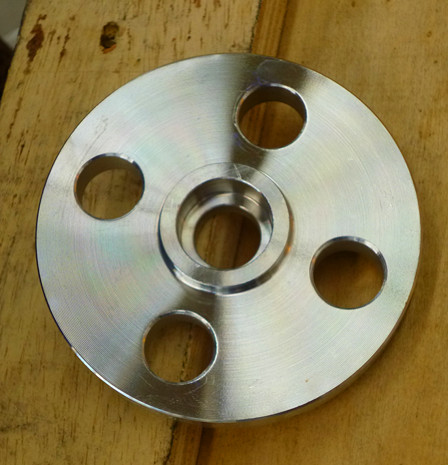Stainless Steel Forging
Stainless Steel Forging
What Is Stainless Steel Forging?
The process of stainless steel forging is a specialized technique employed to craft desired components and parts from stainless steel alloys, a material known for its exceptional corrosion resistance and durability. This process involves heating the stainless steel to a malleable temperature and then shaping it through hammer blows or a press. Although stainless steel is highly forgeable, its inherent strength at forging temperatures may require more force or strikes compared to other alloys. This versatility makes stainless steel forging well-suited for a wide range of industrial applications.
About Stainless Steel Alloys
Stainless steel encompasses a diverse range of steel alloys, each possessing unique properties. Among the most prevalent stainless steel alloys utilized in forging are austenitic, martensitic, ferritic, and duplex varieties. These distinct stainless steel types offer specific features, such as corrosion resistance, high-temperature strength, or improved toughness, tailored to various application needs.
Forging Techniques
Diverse methods such as open die forging and closed die forging can be employed in producing Stainless steel. The selection of the technique hinges on factors such as component complexity, production volume, and desired characteristics. Closed die forging is commonly favored for intricate and precision-demanding parts, while open die forging is employed for simpler geometries.
The Stainless Steel Forging Process
The typical stainless steel forging process comprises the following stages:
1. Preparing the Billet: The raw stainless steel material, often in the form of billets or bars, is preheated to an optimal forging temperature to enhance its malleability.
2. Forging Stage: The billet, having been preheated, is positioned either between two dies for closed die forging or on an open die for open die forging. High-pressure forces are then applied through hydraulic presses or mechanical hammers, to cause the stainless steel to deform and take the shape of the dies.
3. Heat Treatment: Following the forging process, the stainless steel component will undergo heat treatment procedures, including annealing, quenching, and tempering, to attain precise mechanical characteristics and enhance the material's microstructure.
4. Machining (Optional): This stage depends on the component's requirements. Supplementary machining processes may be applied to specific parts to achieve exact dimensions and a refined surface finish.
2. Forging Stage: The billet, having been preheated, is positioned either between two dies for closed die forging or on an open die for open die forging. High-pressure forces are then applied through hydraulic presses or mechanical hammers, to cause the stainless steel to deform and take the shape of the dies.
3. Heat Treatment: Following the forging process, the stainless steel component will undergo heat treatment procedures, including annealing, quenching, and tempering, to attain precise mechanical characteristics and enhance the material's microstructure.
4. Machining (Optional): This stage depends on the component's requirements. Supplementary machining processes may be applied to specific parts to achieve exact dimensions and a refined surface finish.
Advantages of Stainless Steel Forging
Stainless steel forging offers several advantages:
●Corrosion Resistance: Stainless steel possesses inherent corrosion resistance, rendering it well-suited for use in demanding environments, including marine, chemical, and food processing industries.
●High Strength: Stainless steel components produced through forging demonstrate remarkable tensile strength, enabling them to withstand substantial loads and endure severe conditions.
●Durability: Stainless steel components are renowned for their extended lifespan and resistance to wear and deterioration.
●Material Efficiency: Forging minimizes material waste, reducing costs and environmental impact.
●High Strength: Stainless steel components produced through forging demonstrate remarkable tensile strength, enabling them to withstand substantial loads and endure severe conditions.
●Durability: Stainless steel components are renowned for their extended lifespan and resistance to wear and deterioration.
●Material Efficiency: Forging minimizes material waste, reducing costs and environmental impact.
The Stainless Steel Forging Applications
Stainless steel forging is utilized in various industries, including:
●Aerospace: Crafting aircraft components, engine parts, and landing gear.
●Automotive: Manufacturing engine and transmission components, exhaust systems, and suspension parts.
●Oil and Gas: Producing valves, fittings, and drilling equipment.
●Medical: Creating surgical instruments, implants, and components for medical devices.
●Food Processing: Fabricating conveyor systems, cutting tools, and equipment parts.
●Automotive: Manufacturing engine and transmission components, exhaust systems, and suspension parts.
●Oil and Gas: Producing valves, fittings, and drilling equipment.
●Medical: Creating surgical instruments, implants, and components for medical devices.
●Food Processing: Fabricating conveyor systems, cutting tools, and equipment parts.
Stainless steel forging serves as a versatile method for creating a wide range of manufactured components across various industries, largely owing to its remarkable resistance to corrosion. With its widespread availability and its favorable combination of strength and ductility, stainless steel emerges as a cost-effective solution for metal fabrication across most markets.
Products List
CR 14 SSF 02
China ASME Stainless Steel Flange Forging Part Manufacturer Creator Supplies SS Flange Forging Parts, ASME, ANSI, API, JIS, DIN, UNI, BS Standards.

